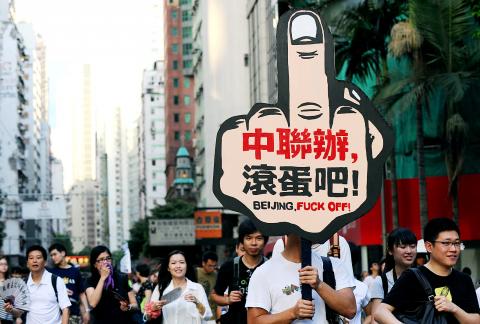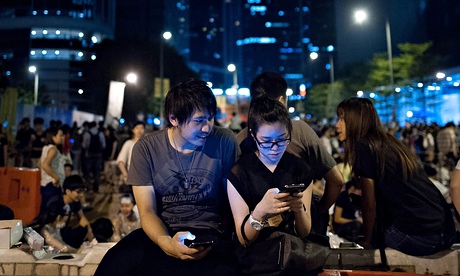Re: What is Occupy Central? 10 key facts about Hong Kong’s pro-democracy movement
FireChat
Open Garden - September 30, 2014
https://play.google.com/store/apps/details?id=com.opengarden.firechat&hl=en
FireChat – the messaging app that’s powering the Hong Kong protests
The internet is vulnerable to state intervention, but demonstrators have found a way around it
The Guardian, Monday 29 September 2014 17.20 BST
Pro-democracy supporters looking at a phone Pro-democracy supporters checking their phones during the protests in Hong Kong. Photograph: Anthony Kwan/Getty Images
Joshua Wong, a 17-year-old student in Hong Kong, had a problem. You will have experienced a version of it yourself: you are at a football match or a gig and you need to find a friend. But the crowd means that the network is overloaded, and you can’t get a signal on your phone. The thing that means you need to call someone is the very thing that means you can’t.
For Wong, the problem was more serious: he wasn’t at a football match, but playing a leading role in the organisation of the pro-democracy protests that have shaken his city over the past week. And he wasn’t just worried the network would be overloaded – he was worried the authorities would block it on purpose.
Every major display of social unrest these days seems to come with a game-changing technological accompaniment. The London riots were narrated on BlackBerry Messenger. Twitter played an essential role in the Arab spring. Turkish protesters who found the internet blocked turned to censor-proof Virtual Private Networks. But none of those innovations was much use without a connection. For Wong and his allies in Hong Kong, the answer was an app that allows people to send messages from phone to phone without mobile reception, or the internet: FireChat.
When you download it, FireChat looks like an unexceptional venue for inane online chat about sport and TV. But it’s more than that. If the network is down, FireChat can use Bluetooth – really just a sexed-up radio signal – to talk to nearby users. The protesters may find something satisfying in the way the system works, gaining strength like a movement, or a radical idea, not through a top-down imposition, but from thousands of little connections. Every new participant increases the network’s range and strength. “Usually, the more people there are in the same location, the less connectivity you get,” says Micha Benoliel, one of the app’s creators. “But with our system, it’s the opposite.”
FireChat has already been used in protests in Taiwan, Iran and Iraq, but never on the scale being seen in Hong Kong. After Wong urged his movement to use it, FireChat got more than 100,000 new sign-ups in Hong Kong in under 24 hours; it has registered 800,000 chat sessions since. If the Communist party isn’t quite reeling, its opponents’ lives have at least got a little easier.
Of course, users would do well to take care: there is nothing to stop the authorities hopping on to the network as well. Benoliel recommends people avoid real names; this is, he says, for information-sharing, not for secrets. Still, in a sense, that is exactly the point. “Our mission has always been freedom of speech, to help information to spread. So this is perfect.”















